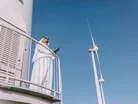Orange in MEA: Renewable Energy, Emissions & Net Zero

For telecommunications titan Orange, the sustainable shift to renewable energy is a huge priority. For the millions of customers across Africa and the Middle East, Orange is engaging in initiatives to reduce its CO2 emissions, to reach its net zero target: 2040.
Orange is a French telecommunications operator, founded in 1988. It has expanded as a telecommunication service for multinational companies under the brand Orange Business, with a strategic plan, to: ‘Lead the future, built on a new business model and guided by responsibility and efficiency.’ Its net zero target has a huge part to play here.
Powering Africa and the Middle East with renewable energy
To keep up with customer expectations and stakeholder demands, Orange is pursuing net zero.
Jerome Goulard, Chief Sustainability Officer at Orange Business, sees sustainability come to life in the way its customers are addressing their sustainability requirements.
“Instead of sustainability being an annexed questionnaire, it is now becoming a key strategic pillar – and more organisations rate ESG (Environmental, Social and Governance) criteria as highly as technical performance or price in their RFP scoring,” he told Sustainability magazine.
In Africa and the Middle East, Orange resells surplus energy generated by its solar farms to surrounding communities, at an affordable price. Orange also sells a solar kit, which helps people adapt their electricity to their needs and budget.
The company is also developing various renewable energy projects across Burkina Faso, Cameroon, Central African Republic, Côte d'Ivoire, Guinea Bissau, Guinea Conakry, Liberia, Madagascar, Senegal and Sierra Leone with its Energy Service Company (ESCO) partners, that can equip Orange’s telecom towers.
Over in Morocco and Tunisia, Orange has launched several solarisation projects along with partners to produce 3.4 MWp of solar energy to supply data centres, in seven of our countries in the region. Now, 20% of Orange’s data centre sites in Africa and the Middle East are solar powered.
Check out Top 10: Sustainable Data Centre Companies.
This can reduce fuel consumption by 80%, powering Orange’s mobile phone infrastructure while avoiding more than 330,000 metric tonnes of CO2eq every year.
Orange’s circular economy
The circular economy is a new economic functionality informed by circular business models, rather than a system in which resources are mined, made into products and then left to become waste. The circular economy increases product lifetimes and reuses raw materials, giving new leases of life. In 2022, 5.3bn mobile phones were thrown away - not resold or recycled. There’s a huge environmental price for staying online and Orange wants to change that.
Orange has partnered with the UN to introduce a circular economy for mobile and network equipment waste in Egypt, in addition to developing local infrastructure and skills. The Egyptian government wants to increase its recycling rate by 25% before 2030, while still ensuring that hazardous waste is disposed of safely.
Over in Jordan, Orange has changed its electricity supply model and uses solar power. Its three solar farms generated enough power to supply 52% of Orange Jordan’s electricity needs in 2023, on a full-year basis. As a result, 22,863 metric tonnes of CO2eq were avoided that year (Scopes 1 & 2) in the country.
******
Make sure you check out the latest edition of Mobile Magazine and also sign up to our global conference series - Tech & AI LIVE 2024
******
Mobile Magazine is a BizClik brand
- Concerns for Apple’s iPhone iOS 18 ‘Tap to Cash’ FeatureMobile Operators
- Three UK & Ericsson team up for Smart & Sustainable NetworksSustainability
- Extreme Networks’ David Coleman on World Wi-Fi Day 2024Wireless Networks
- Vodafone’s Refurbished Phones & Glastonbury Festival AppMobile Operators

